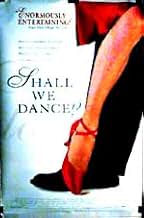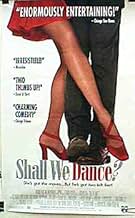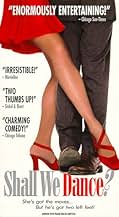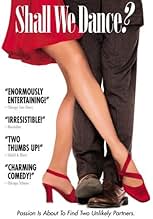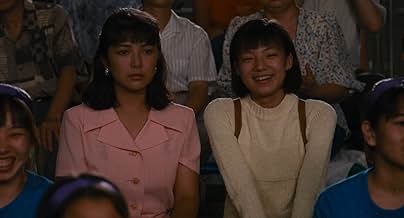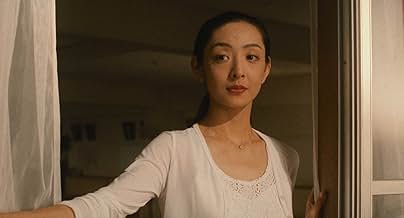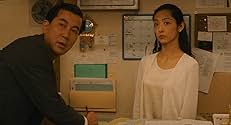AVALIAÇÃO DA IMDb
7,7/10
12 mil
SUA AVALIAÇÃO
Adicionar um enredo no seu idiomaA successful but unhappy Japanese accountant finds the missing passion in his life when he begins to secretly take ballroom dance lessons.A successful but unhappy Japanese accountant finds the missing passion in his life when he begins to secretly take ballroom dance lessons.A successful but unhappy Japanese accountant finds the missing passion in his life when he begins to secretly take ballroom dance lessons.
- Prêmios
- 55 vitórias e 7 indicações no total
Eri Watanabe
- Toyoko Takahashi
- (as Eriko Watanabe)
Reiko Kusamura
- Tamako Tamura
- (as Raiko Kusamura)
Avaliações em destaque
10joshL1
I don't like "grade inflation" but I just had to give this a 10. I can't think of anything I didn't like about it. I saw it last night and woke up today thinking about it. I'm sure that the Hollywood remake that someone told me about, with J Lo and Richard Gear, will be excellent, but this original Japanese version from 1996 was so emotional and thought-provoking for me that I am hard-pressed to think of any way that it could be improved, or its setting changed to a different culture.
A story I found worth watching, and with o fist-fight scenes or guns going off or anything of the sort! Imagine that!
All the characters seemed well-developed, ... even non-primary characters had good character-development and enjoyable acting, and the casting seemed very appropriate.
It's always hard to find a good movie-musical in our day and age, and perhaps this doesn't quite qualify (there is plenty of learning how to dance, but no singing) but I really think that Gene Kelly and others who championed a place for dance in our lives would have thought so very highly of this film and the role of dance in helping to tell a story about a middle aged man, successful with a family in Japan, looking for something... he knows not precisely what.
To the team of people in Japan who contributed to this film, thank you for creating and doing it.
A story I found worth watching, and with o fist-fight scenes or guns going off or anything of the sort! Imagine that!
All the characters seemed well-developed, ... even non-primary characters had good character-development and enjoyable acting, and the casting seemed very appropriate.
It's always hard to find a good movie-musical in our day and age, and perhaps this doesn't quite qualify (there is plenty of learning how to dance, but no singing) but I really think that Gene Kelly and others who championed a place for dance in our lives would have thought so very highly of this film and the role of dance in helping to tell a story about a middle aged man, successful with a family in Japan, looking for something... he knows not precisely what.
To the team of people in Japan who contributed to this film, thank you for creating and doing it.
Shohei Sugiyama is a dispirited salaryman who has lost his lust for life. Despite having a wife and daughter, a nice house and a steady job, depression grips him. One day, while riding the train home, he spots a beautiful, forlorn looking woman-Mai Kishikawa- gazing out the window of a dance studio. Although not really interested in dance, Sugiyama plucks up enough courage to take lessons in the studio, in order to get to know her. Under the tuition of the elderly Tamako Tamura, however, he begins to fall in love with dancing, finding meaning in his life once more.
Written and directed by Masayuki Suô, 'Shall We Dance?' is a heartwarming comic-drama that works on multiple levels. Funny and sad both, it can be viewed as a critique of rigid, conformist Japanese society, which is contrasted with the expressive, liberating Western dance practiced in the studio. It also shows how one's life can become better and more meaningful by following a dream or goal, and how purpose can be restored by doing so. Conversely, it also illustrates how communication and honesty are vital for relationships to prosper, shown through the clashes and confusions between Sugiyama and his wife Masako, as well as those between Mai and her old dance partner.
Above all else, it is a love letter to ballroom dancing, and those that practice it. Sugiyama's stale existence is given colour and excitement after he joins the studio. Not only does he have something to live for, but he begins meeting people who genuinely affect him. Whether it is his mentor Tamura, or his friend Tomio Aoki, everyone he meets while dancing brings something to his life, not least of which is Mai, who- perhaps inadvertently- teaches him to love again. Suô's screenplay is full of depth, as well as great, witty dialogue, and is compelling and captivating.
Naoki Kayano's cinematography is stylish and evocative, contributing to the mood of the piece. He captures the dance sequences with verve, heightening the emotion with his tracking shots and snappy zooms. He contrasts the dull, dour tones of Sugiyama's office and home with the bright, colourful hues of the dance studio and the ballroom competitions, reflecting the different worlds that Sugiyama inhabits. Lush and memorable, Kayano's work complements the graceful and energetic movements of the dancers, creating a remarkable visual spectacle.
Moreover, the expertly choreographed dancing is incredible to behold. The film makes ballroom dancing- when learnt properly- look like the most beautiful expression of emotion on earth. The soundtrack is stirring, making excellent use of songs by the likes of Rogers and Hammerstein, while Yoshikazu Suo's original score complements the narrative astutely. Furthermore, Kyôko Heya's production design- in conjunction with Kayano's visuals- is full of contrast and realism, bolstering the film's impact.
Koji Yakusho stars as Sugiyama, opposite Tamiyo Kusakari as Mai, Reiko Kusamura as Tamura and Naoto Takenaka as Aoi. Yakusho, as always, makes the character compelling and complex, bringing much humour to the role. We empathise with Sugiyama, and are on his side the whole way through. Kusakiri, a professional dancer in her first acting role, is excellent, displaying Mai's reserve and inner feelings marvellously. Kusamura nearly steals the show as the kind-hearted Tamura, while Takenaka is a source of constant delight as the Salsa-dance loving Aoi. In addition, Hideko Hara does strong work as Sugiyama's wife Masako, sharing a great chemistry with Yakusho.
In conclusion, Masayuki Suô's 'Shall We Dance?' is a delightful, funny film both poignant and powerful. With a strong screenplay full of humorous dialogue and scenes, striking cinematography and production design and a memorable score, it works on many levels. Boasting terrific performances from all in the cast- especially those of Koji Yakusho, Tamiyo Kusakiri and Reiko Kusamura- and featuring much expertly choreographed ballroom dancing, if the question is 'Shall We Dance?', the answer must surely be yes.
Written and directed by Masayuki Suô, 'Shall We Dance?' is a heartwarming comic-drama that works on multiple levels. Funny and sad both, it can be viewed as a critique of rigid, conformist Japanese society, which is contrasted with the expressive, liberating Western dance practiced in the studio. It also shows how one's life can become better and more meaningful by following a dream or goal, and how purpose can be restored by doing so. Conversely, it also illustrates how communication and honesty are vital for relationships to prosper, shown through the clashes and confusions between Sugiyama and his wife Masako, as well as those between Mai and her old dance partner.
Above all else, it is a love letter to ballroom dancing, and those that practice it. Sugiyama's stale existence is given colour and excitement after he joins the studio. Not only does he have something to live for, but he begins meeting people who genuinely affect him. Whether it is his mentor Tamura, or his friend Tomio Aoki, everyone he meets while dancing brings something to his life, not least of which is Mai, who- perhaps inadvertently- teaches him to love again. Suô's screenplay is full of depth, as well as great, witty dialogue, and is compelling and captivating.
Naoki Kayano's cinematography is stylish and evocative, contributing to the mood of the piece. He captures the dance sequences with verve, heightening the emotion with his tracking shots and snappy zooms. He contrasts the dull, dour tones of Sugiyama's office and home with the bright, colourful hues of the dance studio and the ballroom competitions, reflecting the different worlds that Sugiyama inhabits. Lush and memorable, Kayano's work complements the graceful and energetic movements of the dancers, creating a remarkable visual spectacle.
Moreover, the expertly choreographed dancing is incredible to behold. The film makes ballroom dancing- when learnt properly- look like the most beautiful expression of emotion on earth. The soundtrack is stirring, making excellent use of songs by the likes of Rogers and Hammerstein, while Yoshikazu Suo's original score complements the narrative astutely. Furthermore, Kyôko Heya's production design- in conjunction with Kayano's visuals- is full of contrast and realism, bolstering the film's impact.
Koji Yakusho stars as Sugiyama, opposite Tamiyo Kusakari as Mai, Reiko Kusamura as Tamura and Naoto Takenaka as Aoi. Yakusho, as always, makes the character compelling and complex, bringing much humour to the role. We empathise with Sugiyama, and are on his side the whole way through. Kusakiri, a professional dancer in her first acting role, is excellent, displaying Mai's reserve and inner feelings marvellously. Kusamura nearly steals the show as the kind-hearted Tamura, while Takenaka is a source of constant delight as the Salsa-dance loving Aoi. In addition, Hideko Hara does strong work as Sugiyama's wife Masako, sharing a great chemistry with Yakusho.
In conclusion, Masayuki Suô's 'Shall We Dance?' is a delightful, funny film both poignant and powerful. With a strong screenplay full of humorous dialogue and scenes, striking cinematography and production design and a memorable score, it works on many levels. Boasting terrific performances from all in the cast- especially those of Koji Yakusho, Tamiyo Kusakiri and Reiko Kusamura- and featuring much expertly choreographed ballroom dancing, if the question is 'Shall We Dance?', the answer must surely be yes.
10ven2s
This movie is among my favorite foreign films, some of the others are Amilee and My Life As a Dog. The similarities with those movies as with so many great foreign films, is that it takes a mundane slice of life and transforms it into a profound heartfelt lesson.
In Japan, a man who is bored with his mundane life and the rut of his married life, sees a beautiful Japanese woman staring out the window of a dance studio. In the instant that it takes his train to pass, he is enthralled by her. But is it only by her beauty, by her faraway glance, or a connection that they will both discover that they share?
Shall We Dance has memorable wonderful characters who have to deal with painful realities by transcending them through the world of dance. Breaking traditional moulds and stereo types of Japanese society, they risk all for happiness and find that joy is not too far away. It is one of those movies that is so magical and meaningful and, in itself, transcends the mundane by showing the true magic and miracle that life can be.
In Japan, a man who is bored with his mundane life and the rut of his married life, sees a beautiful Japanese woman staring out the window of a dance studio. In the instant that it takes his train to pass, he is enthralled by her. But is it only by her beauty, by her faraway glance, or a connection that they will both discover that they share?
Shall We Dance has memorable wonderful characters who have to deal with painful realities by transcending them through the world of dance. Breaking traditional moulds and stereo types of Japanese society, they risk all for happiness and find that joy is not too far away. It is one of those movies that is so magical and meaningful and, in itself, transcends the mundane by showing the true magic and miracle that life can be.
A middle-aged accountant in an established, successful Japanese firm has a house, a wife, and a beautiful daughter. He works hard all day, comes home, goes to sleep, and then does the whole thing over again. He's a man who's lost his soul. He's an automaton, a cog in the larger Japanese industrial society. As old Karl Marx would have put it, he's alienated from the larger society of his fellow workers, his family, and from himself. What a predicament.
On the way home from work, he spots a beautiful but melancholy woman looking out the window of a dance studio. Every night, she's there, calling to him like a siren or one of the fabled wood nymphs. There's a sexual attraction that fuels his interest. But there's also much more: he immediately identifies with her, feels an instant sense of connection, because she is outwardly expressing his inner angst. So he takes the leap, overcomes his fear, and signs up for dance lessons.
In the West, this commonplace occurrence would go unnoticed: we would say that Mr. Sugiyama is having a `mid-life crisis.' We would expect him to have an affair with his secretary, or suddenly buy leathers and a Harley and hit the road. But in Japan, where Ballroom dancing is viewed as lascivious, perhaps even perverted behavior, this makes for a much more interesting dilemma. The main character, Mr. Sugiyama, a respectable accountant, is drawn into dance by the alluring siren. He acts on his impulse to get to know her. But then, when reality sets in that he will never win her affection, he falls in love with dance. It becomes his personal means both of self-discovery, and self-expression. It's a fascinating transformation.
One of the reasons that this movie works so well is its rich and varied set of characters, all of which are simply adorable. This is an incredibly impressive Japanese film. It's a must-see video.
On the way home from work, he spots a beautiful but melancholy woman looking out the window of a dance studio. Every night, she's there, calling to him like a siren or one of the fabled wood nymphs. There's a sexual attraction that fuels his interest. But there's also much more: he immediately identifies with her, feels an instant sense of connection, because she is outwardly expressing his inner angst. So he takes the leap, overcomes his fear, and signs up for dance lessons.
In the West, this commonplace occurrence would go unnoticed: we would say that Mr. Sugiyama is having a `mid-life crisis.' We would expect him to have an affair with his secretary, or suddenly buy leathers and a Harley and hit the road. But in Japan, where Ballroom dancing is viewed as lascivious, perhaps even perverted behavior, this makes for a much more interesting dilemma. The main character, Mr. Sugiyama, a respectable accountant, is drawn into dance by the alluring siren. He acts on his impulse to get to know her. But then, when reality sets in that he will never win her affection, he falls in love with dance. It becomes his personal means both of self-discovery, and self-expression. It's a fascinating transformation.
One of the reasons that this movie works so well is its rich and varied set of characters, all of which are simply adorable. This is an incredibly impressive Japanese film. It's a must-see video.
Okay. As you can see this is one of my favorite if not favorite films. This is a character drama which is absolutely hilarious. The main character is a business man who is stuck in a "same thing, different day" mentality. He sees a woman looking melancholy out a window of a dance studio from his train everyday and wonders about her and decides to find out more about her. He decides to join the dance class only to find out she is not the instructor. From there he bonds with four other dancers and learns to enjoy dancing as well as finding out about the mysterious woman.
There is no gratuitous (or any) sex involved, just how a small group of people learn how friendships are formed and developed.
This film was remade with Richard Gere and Jennifer Lopez and the new one while appealing is nowhere as enjoyable as the original. The movie never made it big in America because it was not eligible for the Oscars since it was broadcast on television in Japan (movies cannot be released on TV or they are disqualified for Oscar nominations). It did win numerous awards in Japan for best film, cast, director etc for their "Oscar" awards.
There is no gratuitous (or any) sex involved, just how a small group of people learn how friendships are formed and developed.
This film was remade with Richard Gere and Jennifer Lopez and the new one while appealing is nowhere as enjoyable as the original. The movie never made it big in America because it was not eligible for the Oscars since it was broadcast on television in Japan (movies cannot be released on TV or they are disqualified for Oscar nominations). It did win numerous awards in Japan for best film, cast, director etc for their "Oscar" awards.
Você sabia?
- CuriosidadesIn the first scene, a man's shoe in close-up plunges into a black pool in the street. This symbolizes the world renowned Ballroom Dancing Competition in Blackpool, England, referenced later in the film.
- Citações
Shohei Sugiyama: At my age, it's embarrassing to say so, but every day I feel so alive.
- Versões alternativasOriginal Japanese version (pre-Miramax) runs 136 minutes and is available on Hong Kong laseridisc with English and Chinese subtitles.
Principais escolhas
Faça login para avaliar e ver a lista de recomendações personalizadas
- How long is Shall We Dance??Fornecido pela Alexa
Detalhes
Bilheteria
- Faturamento bruto nos EUA e Canadá
- US$ 9.619.222
- Faturamento bruto mundial
- US$ 9.619.222
Contribua para esta página
Sugerir uma alteração ou adicionar conteúdo ausente



